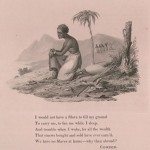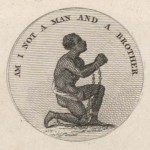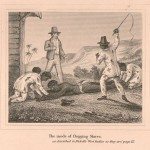Commerce, Slavery and Anti-slavery
- • The Anti-Saccharists:
By 1791 the moral and intellectual case against the slave trade and slavery had been developed and presented in print and propaganda, but the campaigners had not achieved success. After the defeat of an abolitionist bill in the House of Commons in April 1791, the focus changed to economic pressure. A boycott of West Indian sugar was designed to attack the economic basis of slavery. A voluntary ban on sugar had been suggested in pamphlets in the 1780s. One author, William Fox argued that the slave trade would end if 38,000 families boycotted West Indian sugar. By the 1780s, Britain consumed more sugar than the rest of Europe combined, so the anti-saccharists had considerable potential to make an impact. On one of his tours in 1791, Thomas Clarkson noted:
There was no town, through which I passed, in which there was not one individual who had left off the use of sugar….They were of all ranks and parties. Rich and poor, churchmen and dissenters had adopted this measure….in gentlemen’s families, where the master had set the example, the servants had often voluntarily followed it; and even children…excluded with the most virtuous resolution, the sweets…from their lips.
An insight into motives is provided by the young Mary Anne Galton, the daughter of Lunar Society member Samuel Galton junior:
My father had a very large acquaintance with the affluent West India merchants of Liverpool. They were most kindly, generous, and hospitable; their houses were like palaces. I was amazed to see the sumptuous drawing-rooms, rich with satin and silk, in houses where there was no library. But what surprised me most…was the multitude of black servants, almost all of whom had originally been slaves; this deeply moved my compassion, and when I saw the table laden with West India produce, in its various forms of fruit and sweetmeats, and saw the black servants looking on at the produce of a land, their native home, which they had left for us, and of which they might not partake, my heart often ached; and it is no wonder that my resolution was confirmed never to taste anything made with sugar, or to use other West Indian commodities.
Thousands of people stopped consuming sugar or substituted East Indian sugar for the West Indian version. One report showed that a Birmingham grocer found that his sugar sales were cut by 50% in four months. Despite widespread support, the Anti-saccharist campaign failed to change the law.
- • Boulton and Watt
Individuals could be compromised – or compromise themselves, when commercial interests conflicted with principles. Matthew Boulton and James Watt were businessmen and were keen to do business with West Indian slave owners. They explored the prospect of selling steam engines to slave plantations in the Caribbean and in 1783 Boulton had entertained Mr Pennant, a notorious slave owner who owned huge estates in Jamaica and sought steam engines for his plantations there.
In 1790 Samuel Galton recommended to John Dawson, a Liverpool-based slave trader, that he should contact Boulton and Watt and about supplying steam engines for Dawson’s sugar works in Trinidad. The latter wrote to Boulton and Watt on 9 November 1790:
Sirs, I have been considering of the conversation Mr Galton & I had respecting the merits of the Steam Engine as I am going to have some Sugar Works erected in the Island of Trinidad & wish to have your Ideas & the opinion of experienc’d people how far it would be practicable to erect them on that plan: the want of Wind & Water the principle on which they are at present work’d, retards the progress so very much, particularly in crop time, That if an engine could be invented with a certainty of answering the purpose, the Rolers so contriv’d that if possible to have a greater effect in the pressing of the Cane than what is at present used but I must observe to you that without wood fire will answer the same purpose as coal, the undertaking would be very hazardous, Coals could not be laid in at that island for less than 71/6 pr Chaldron, the duty being 15/6.
I shall thank you to give me every information of the practicability of this scheme for could it be made to answer, a large field would be open in that quarter of the Globe, the King of Spain having granted a loan of a million Dollars to the Inhabitants of Trinidad for the purpose of erecting Sugar Works & purchase of Slaves which I am to have the supplying of. Should be happy to give every encouragement in the introduction of such a plan with yourself & I can engage the Governor will do the same.
Your reply will oblige Sir
John Dawson
Boulton and Watt’s reply top Dawson does not survive, but their partnership supplied steam engines to plantations in the West Indies.
- • James Watt
Watt, nevertheless, was a critic of slavery. On 31 October 1791, he corresponded on behalf of the firm of Boulton and Watt to Messrs Beguye & Co. of Nantes concerning the suspension of the production of their steam engine order following the outbreak of the slave revolt in the French West Indian colony of San Domingo (now Haiti). Watt wrote:
Gentlemen
The late unpropitious news from St. Domingo has made us suspend the prosecution of the order for your Engine until we hear from you. We have written to the foundery for that purpose & expect that no material expense has yet been incurred.
We thought it our duty to give you this information, to relieve part of your anxiety in case any fatal accident should have befallen your friend Mr. Bertrand.
We sincerely condole with the unhappy sufferers, though we heartily pray that the system of slavery so disgraceful to humanity were abolished by prudent though progressive measures.
We remain etc.
Boulton & Watt.
- • Samuel Galton junior
The role of another Lunar Society figure and Birmingham manufacturer, Samuel Galton junior provides an insight into the compromises which businessmen had to make when their interests conflicted with principles. Galton was a Quaker and therefore a member of a pacifist sect, but the family firm made huge sums of money exporting guns which were sold as part of the slave trade. Galton was forced by his fellow Quakers to confront the tensions between his beliefs and his business interests.
In 1792 a committee was appointed to collect subscriptions to enlarge the Quaker Meeting House in Bull Street. The appeal raised an ethical point. One of the friends, Joseph Robinson wrote to the committee as follows:
“When so many eyes are opened to scrutinize into the several branches of the African trade,- the minutest of which are likely to be weighed and exposed, the supplying of slightly proved guns to the Merchants of the coast of Guinea, doubtless to be used by the natives in their wars with each other, and for us to receive part of the thousands of pounds which have probably been accumulated by a 40 year’s commerce in these articles, and apply it to the use of Friends, is, I think, a matter which requires your very serious consideration.”
The only two members of the Meeting who were gun makers were Samuel Galton senior and his son Samuel Galton junior. The matter was taken further by local Quakers. Samuel Galton senior retired from the gun trade, but Samuel Galton junior mounted a spirited defence in To the Friends of the Monthly Meeting at Birmingham, 1795.
The censure and the laws of the Society against slavery are as strict and decisive as against war. Now, those who use the produce of the labour of slaves, such as Tobacco, Rum, Sugar, Rice, Indigo and Cotton, are more intimately and directly the promoters of the slave trade, than the vendor of arms is the promoter of war, because the consumption of these articles is the very ground and cause of slavery.
These arguments did not carry weight with the Society of Friends and on 10 August 1796 it disowned Samuel Galton junior as a member of the Society. Galton continued to attend Quaker worship but could no longer participate in business meetings. When he gave up the gun business in 1804 and started banking, the Society accepted a donation from him towards the enlargement of the Quaker burial ground. The historian Barbara M D Smith records: “Galton’s attitude reflects an entrepreneur’s pragmatic approach to moral issues that conflict with business and a robust determination to speak out plainly…”
« Previous in this sectionNext in this section »Continue browsing this section
 The Lunar Society and the Anti-slavery Debate
The Lunar Society and the Anti-slavery Debate
 Anti-slavery and the Midlands
Anti-slavery and the Midlands
 Anti-slavery: Poetry, Images and Ideas
Anti-slavery: Poetry, Images and Ideas
 Commerce, Slavery and Anti-slavery
Commerce, Slavery and Anti-slavery
 Abolition of the Slave Trade and Slavery
Abolition of the Slave Trade and Slavery





